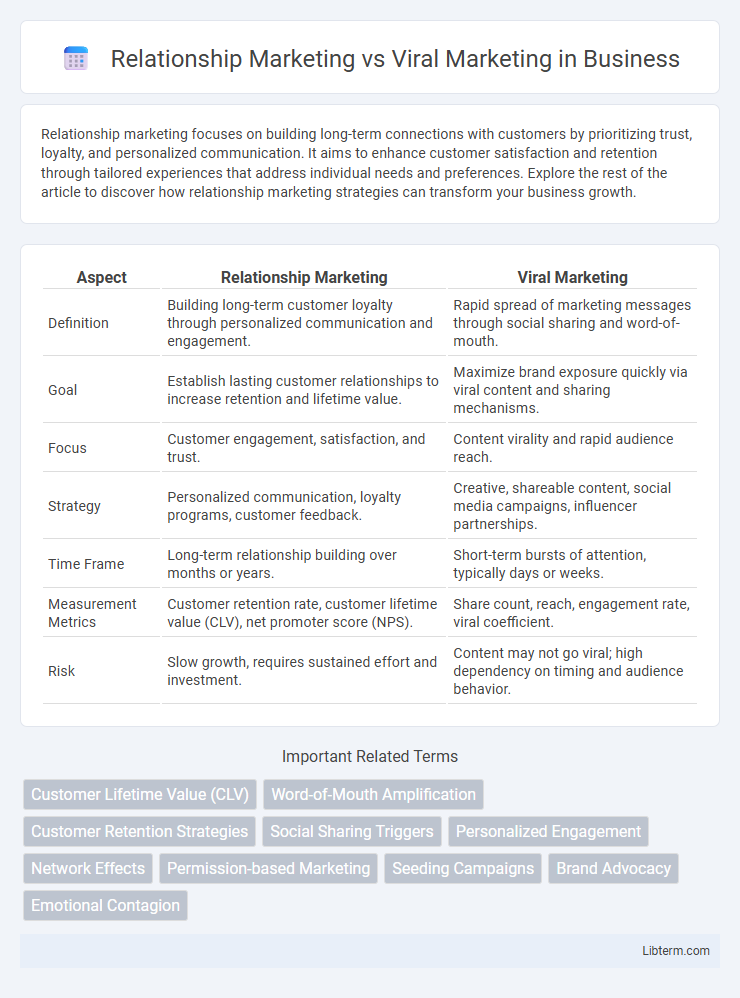Relationship marketing focuses on building long-term connections with customers by prioritizing trust, loyalty, and personalized communication. It aims to enhance customer satisfaction and retention through tailored experiences that address individual needs and preferences. Explore the rest of the article to discover how relationship marketing strategies can transform your business growth.
Table of Comparison
| Aspect | Relationship Marketing | Viral Marketing |
|---|---|---|
| Definition | Building long-term customer loyalty through personalized communication and engagement. | Rapid spread of marketing messages through social sharing and word-of-mouth. |
| Goal | Establish lasting customer relationships to increase retention and lifetime value. | Maximize brand exposure quickly via viral content and sharing mechanisms. |
| Focus | Customer engagement, satisfaction, and trust. | Content virality and rapid audience reach. |
| Strategy | Personalized communication, loyalty programs, customer feedback. | Creative, shareable content, social media campaigns, influencer partnerships. |
| Time Frame | Long-term relationship building over months or years. | Short-term bursts of attention, typically days or weeks. |
| Measurement Metrics | Customer retention rate, customer lifetime value (CLV), net promoter score (NPS). | Share count, reach, engagement rate, viral coefficient. |
| Risk | Slow growth, requires sustained effort and investment. | Content may not go viral; high dependency on timing and audience behavior. |
Introduction to Relationship Marketing and Viral Marketing
Relationship marketing emphasizes building long-term customer loyalty through personalized interactions and sustained engagement, enhancing brand trust and customer retention. Viral marketing leverages rapid, peer-to-peer content sharing to generate widespread brand awareness and exponential audience growth in a short time. Both strategies prioritize customer connection but differ in approach: relationship marketing fosters deep, ongoing relationships, while viral marketing focuses on creating shareable, high-impact campaigns.
Core Principles of Relationship Marketing
Relationship marketing centers on building long-term customer loyalty through personalized communication, trust, and consistent value delivery. It emphasizes emotional connections and customer retention by fostering two-way interactions and understanding individual customer needs. In contrast, viral marketing focuses on rapid message dissemination through social sharing, aiming for short-term brand awareness rather than sustained relationships.
Key Characteristics of Viral Marketing
Viral marketing relies on rapidly spreading content through social networks, utilizing high shareability and emotional appeal to engage audiences. Key characteristics include creating compelling, easily shareable messages that encourage user participation and organic growth. Unlike relationship marketing's focus on long-term customer engagement, viral marketing prioritizes swift amplification and widespread visibility.
Audience Targeting and Engagement
Relationship marketing emphasizes building long-term connections by targeting specific audience segments through personalized content and consistent communication, fostering trust and loyalty. Viral marketing leverages emotionally compelling, shareable content designed to engage a broad audience rapidly, relying on social sharing patterns rather than precise targeting. Effective audience engagement in relationship marketing is measured by sustained interactions and customer retention, while viral marketing focuses on rapid spread, reach, and high engagement metrics like shares and impressions.
Communication Channels Used
Relationship marketing primarily utilizes personalized communication channels such as email marketing, social media platforms with direct messaging, and loyalty programs to foster long-term customer engagement. Viral marketing relies heavily on shareable content distributed through social media networks, influencer collaborations, and multimedia platforms like YouTube to achieve rapid exposure and organic reach. Both strategies leverage digital channels but differ in their approach: relationship marketing emphasizes sustained interaction, while viral marketing focuses on high-impact, short-term dissemination.
Campaign Longevity and Sustainability
Relationship marketing emphasizes building long-term customer loyalty through personalized communication and consistent engagement, leading to sustained revenue over extended periods. Viral marketing campaigns typically generate rapid, high-impact exposure but often experience a short lifespan due to fleeting audience interest and trend cycles. Sustainable campaign success is more achievable with relationship marketing strategies that nurture ongoing interactions, whereas viral marketing requires continual innovation to maintain momentum.
Metrics for Measuring Success
Relationship marketing success is primarily measured by customer retention rates, lifetime value (CLV), and engagement metrics such as repeat purchase frequency and satisfaction scores. Viral marketing effectiveness hinges on virality metrics like share rate, referral traffic, and the basic reproduction number (R0) indicating how many new users each participant brings. Conversion rate and return on investment (ROI) are crucial for both strategies to determine overall campaign impact.
Case Studies: Successful Campaign Examples
Relationship marketing excels in fostering customer loyalty through personalized experiences, as demonstrated by Starbucks' Rewards program, which increased repeat purchases by 20%. Viral marketing achieves rapid brand awareness, exemplified by the ALS Ice Bucket Challenge, which raised $115 million while engaging millions globally. Both strategies leverage emotional connections but differ in execution: relationship marketing builds long-term value, whereas viral marketing drives short-term spikes in visibility.
Challenges and Limitations
Relationship marketing faces challenges such as maintaining continuous customer engagement, managing personalized communication at scale, and the risk of customer fatigue from over-targeting. Viral marketing struggles with unpredictability, the difficulty of controlling message spread, and potential negative backlash if the content is perceived as inauthentic or intrusive. Both strategies require careful measurement and adaptation to overcome limitations in reaching and retaining the target audience effectively.
Choosing the Right Strategy for Your Business
Relationship marketing focuses on building long-term customer engagement through personalized communication and loyalty programs, fostering trust and repeat business. Viral marketing aims to rapidly expand brand awareness by creating highly shareable content that triggers exponential social sharing across digital platforms. Choosing the right strategy depends on your business goals, target audience behavior, and product type, where relationship marketing suits customer retention and viral marketing excels in quick brand exposure.
Relationship Marketing Infographic

 libterm.com
libterm.com